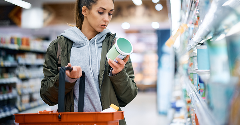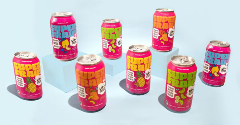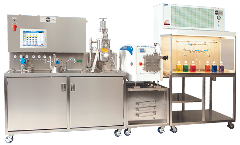Sweetness From Nature – Megatrend Versus Mainstream Business
22 Oct 2013“All natural” is a megatrend in the ingredient industry these days. Many new innovations are taking place throughout the whole ingredient value chain – from farming and manufacturing through to the product formulators and the FMCG marketers. The trend is being closely observed by both industry experts and consumers. More than half of all sweetener […]

“All natural” is a megatrend in the ingredient industry these days. Many new innovations are taking place throughout the whole ingredient value chain – from farming and manufacturing through to the product formulators and the FMCG marketers.
The trend is being closely observed by both industry experts and consumers. More than half of all sweetener discussions in the media, both in traditional and social networks, relate to stevia (58%), in contrast to aspartame (28%) or sucralose (14%). The high communication activity, especially in social networks and online forums, reveals that the natural sweetener concept is often not fully understood. When consumers’ perceptions were tested, Canadean Ingredients found that 79% of consumers knew that stevia is natural. However, 43% and 49% also believed that aspartame and sucralose were natural.
If an ingredient label lists “steviol glycosides from the stevia plant” or “sweetener: E960”, it can be expected to be interpreted differently by the average consumer. The situation is that many consumers do not interpret E numbers as a safety check, but instead interpret it to be that an ingredient with an E number is highly processed and risks being unsafe. Whether the interpretation is natural or synthetic, there is still a long way to go for a mainstream consumer product breakthrough.
Today, 2% of the global consumption volume of low calorie sweeteners in soft drinks is derived from stevia. In the North America and Europe market, 3.2% of non-caloric sweetener consumption is stevia-based. Although the consumption of global soft drinks with natural sweeteners in 2012 is small, it is constantly growing.
When calculating consumption based on the sweetness index, it is apparent that traditional sweeteners still have a significant impact within the soft drinks industry. One of the main reasons for this can be found in the more polarised consumption patterns of Western markets, which influence ingredient decisions for many new soft drink formulations. Consumers are less likely to consume sweetened carbonates (2010-2012 CAGR 2.04%) compared to bottled water (2010-2012 CAGR 6.39%), and they are even less likely to drink natural sweeteners that may be added to juices (2010-2012 CAGR minus 1.05%).
Today, many consumers are moving to drinks containing high sugar, such as energy drinks (2010-2012 CAGR 14.07%). This means they are embracing the less natural profile of these beverages, especially when they are offered as low-caloric versions, as they largely contain synthesised-intense sweeteners. Over the last three years, aspartame consumption in energy drinks grew nearly 20% in North America and 6.5% in Europe.
In 2012, sweetness consumption in energy drinks for all low caloric sweeteners was 325 MT (totalling a nutritional burden of zero calories) and non-caloric sugar types more than 1.1 million MT (totalling a nutritional burden of consuming 4.4 mio kcal). One might ask if this could become a new hot topic on the agenda for nutritional watch dogs.
Each consumer is different in terms of his or her idea of a perfect healthy lifestyle; it can be quite complex, as there are many different views of what is right and wrong/healthy or unhealthy for them. Today, health-conscious consumers may be seen drinking carbonates with normal sugar on a perfectly balanced and rational basis, and then there are other consumers who seem to be living a healthy lifestyle but indulge in high carb energy drinks or other performance beverages. Consumers may be drinking fruit-based carbohydrates, believing this is the healthier choice because of the lack of processed ingredients.
This contradiction between processed ingredients, nutrition and health may be due to groups of consumers’ mistrust in the industry. The main reason for the natural megatrend could well be that less-processed products are considered healthier amongst urbanised Western consumers, who have a romantic dream of foraging for their own food in the wild and growing their own vegetables. Many consumers expect the modern supermarket to be offering choices of healthy, natural products with origin declarations.
When comparing consumers’ attitudes in 2012 versus 2013, we saw there was no change in consumers’ perception of what is the healthiest choice in terms of sweetening agents, as the majority (47% in 2012 and 48% in 2013) still think that honey is the healthiest. However, the number of consumers believing sucralose is the healthiest sweetener has decreased from 16% in 2012 to only 4% in 2013, meanwhile the perception of stevia as the healthiest choice of sweetener has changed in a positive direction – from 9% in 2012 to 14% in 2013.
So the natural trend is booming – but as a mainstream business for the industry, it is still somewhat out in the future in terms of revenues. Consumers take information on board, but slower than industry has anticipated (or predicted).
Related news

Asian beverage brands deal with rising costs
4 Jan 2023
Decreasing bottle sizes or increasing prices? Asian beverage brands are finding “creative approaches” to manage rising costs, according to industry analysts.
Read more
Value-seeking US consumers cut back on food spending
2 Jan 2023
Cheaper items, smaller sizes, and shorter grocery lists: inflationary effects coupled with a global long-term recession are set to continue shaping food spending habits, according to a recent Rabobank report.
Read more
Opportunities grow for lower-caffeine coffee
23 Dec 2022
Many consumers want the mental focus of caffeine without the jitters, prompting a wave of product development such as “half caffeine” ground coffee or ready-to-drink (RTD) cold brew blended with relaxing botanicals.
Read more
Superfrau upcycles liquid whey for energy drinks
22 Dec 2022
US company Superfrau turns surplus whey into sustainable, upcycled-certified dairy products for the recovery drinks market.
Read more
Swedish food agency: One in 10 coffee brands contain excess acrylamide
7 Dec 2022
New findings from the Swedish Food Agency have revealed three of 29 coffee products sampled contained acrylamide above limits, reinforcing the link between levels and degree of roasting.
Read more
Editor’s choice: Our roundup of the latest women’s health products around the world
2 Dec 2022
From botanicals to combat menopause symptoms to a hydration powder for mothers-to-be, here is our roundup of the most innovative new product launches within women’s health.
Read more
The prize no brand wants to win: 2022’s most misleading products
28 Nov 2022
Food industry watchdog Foodwatch is asking consumers to vote for 2022’s most misleading product. A high-sugar vitamin water and “artisan” salad made with artificial additives are among the nominees.
Read more
enduracarb®: A science-backed trehalose ingredient for athletic endurance
24 Nov 2022
enduracarb® is a science-backed, slow-acting carbohydrate that can power athletes’ performance. Produced using a high-purity production process, it is suitable for a wide variety of applications.
Read more
China bans celebrity endorsement of health and formula foods
22 Nov 2022
China is to ban celebrity endorsement or advertising of certain products, completely banning high profile figures with “lapsed morals” as the country attempts to drive society towards “core socialist values”.
Read more
MicroThermics’ Formulators Guide to Process Selection for Plant-Based Beverages
15 Nov 2022
Plant-based beverages & products are mainstream! Come to FIE booth 4D122 & read our whitepaper to see how processing in the lab at commercial HTST & UHT conditions gets you to market faster for less!
Read more